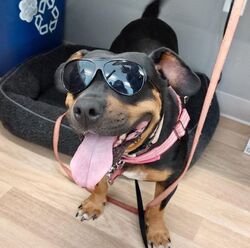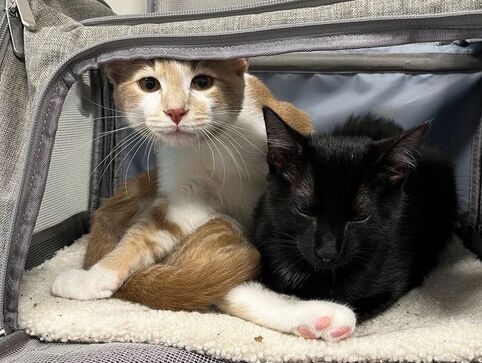|
Travel! Remember that? It’s been a minute since most of us have been jet setting off to other countries. But as things settle down and borders open up, a lot of us have been bit by that travel bug. International travel is already a complicated beast and it only gets harder if you’re planning to bring your pets with you. Every country has different requirements and it can quickly turn into a maze of paperwork and appointments and restrictions. But fear not! Concord Animal Hospital has two USDA accredited veterinarians who are here to help with your international travel needs. Today we’re sitting down with Dr. Katherine Aubert, to cover her top tips for international travel. Start planning early! Like, really early. The sooner the better. Every country has its own requirements for international travel, and between processing times, required tests and vaccinations, and waiting periods, we’ll want as much lead time as possible. Dr. Aubert recommends giving a call as soon as you start making travel plans so that we’ll have a head start on sorting through requirements and preparing necessary documents. You should also let us know as soon as you have flights booked, since many countries require certain things to be done within a very short window before your arrival. “For example,” Dr. Aubert says, “most countries require an exam by a USDA accredited veterinarian within ten days of your arrival. If you start making plans last minute, it can be hard to find the time to make these appointments happen.” Keep your records organized! If you’re preparing for a relaxing vacation then paperwork is probably the last thing you want to worry about, but a little organization now will save you a lot of hassle later! Different countries have different forms that need to be filled out and different records that need to be provided, but one of the most common is a rabies certificate. For many countries you will need an original copy of your pet’s rabies certificate, including their microchip number, signed by the administering veterinarian in blue ink. Some countries may require additional vaccinations, parasite treatment, or other treatments or procedures. So basically, the more documentation you can come with, the better!  Going somewhere sunny Endy? Going somewhere sunny Endy? Double-check that microchip! Many countries require that your pet have an ISO compliant microchip for identification abroad. Not all microchips meet ISO standards; the ones we use at Concord Animal Hospital do, so if your pet was microchipped here you’ll be all set! If your pet was microchipped at another clinic you should check with them to see if the microchip is ISO compliant. If it is not compliant, we’ll typically want to administer a new microchip that is. Leave time for titers! Some countries (such as most European Union members and many Caribbean islands) will require a rabies titer prior to arrival. A titer is a special test that checks the antibody levels present in your pet’s blood to ensure they’re truly protected against a given disease. And while that sounds pretty straight forward, there is a catch; “Rabies titers have to be sent out to special reference laboratories, and typically take 4-6 weeks to process,” Dr. Aubert cautions. So to reiterate point one, start planning early! The last thing you want is for your entire trip to be ruined because a lab didn’t come back in time.  Certify your health! Most countries will require an International Health Certificate, signed by a USDA accredited veterinarian (like Dr. Aubert or Dr. Hardie!), after an exam conducted no more than ten days prior to your arrival in your destination country. “Some countries have longer exam periods or don’t require a certificate at all,” Dr. Aubert says, “but these are the exceptions rather than the rule. After your exam we’ll submit the necessary paperwork to the USDA offices in New York. The approval process can take several days, and then the USDA will overnight you a hard copy of your endorsed certificate, which you’ll need to bring with you while traveling.” So, at the risk of sounding like a broken record, call us early! The sooner you start making plans and getting appointments set up, the more likely we’ll be to get everything arranged in time. Consider giving your pet a vacation of their own! While we all want our pets to join us in our beautiful vacation destinations, travel can be stressful for the little ones. Unfamiliar surroundings, hectic airports, and long flights in cooped up carriers can quickly leave your pet needing a vacation from their vacation. “If you’re only going to be abroad for a week or two,” Dr. Aubert says, “consider leaving your pet with a sitter, a family friend, or a boarding facility. They might be happier for it.” Give us a call! Every country is different! That’s a beautiful sentiment about the diversity of our big wide world, but it’s also a factual statement about international travel requirements. To check the requirements for your destination you can visit the USDA’s Pet Travel Website, which offers a country by country breakdown of precisely what you’ll need. But of course, we’re always happy to help as well! If there’s one thing we hope you’ll take away from this article it’s, you guessed it, call us early! The sooner we can start planning, the more we'll be able to ensure your vacation goes off with less hitches and more scritches. Comments are closed.
|
|
OFFICE HOURS:
Monday-Friday: 8:00 am to 6:00 pm Saturday: 8:00 am to 12:00 pm |
CONTACT INFORMATION:
Concord Animal Hospital 245 Baker Avenue Concord, MA 01742 Phone: (978) 369-3503 Fax: (978) 371-9748 [email protected] |
JOIN OUR PACK!
Sign up for our monthly newsletter, the Paw Press for hospital news, pet care tips and cute pet photos! |
Copyright © 2022

